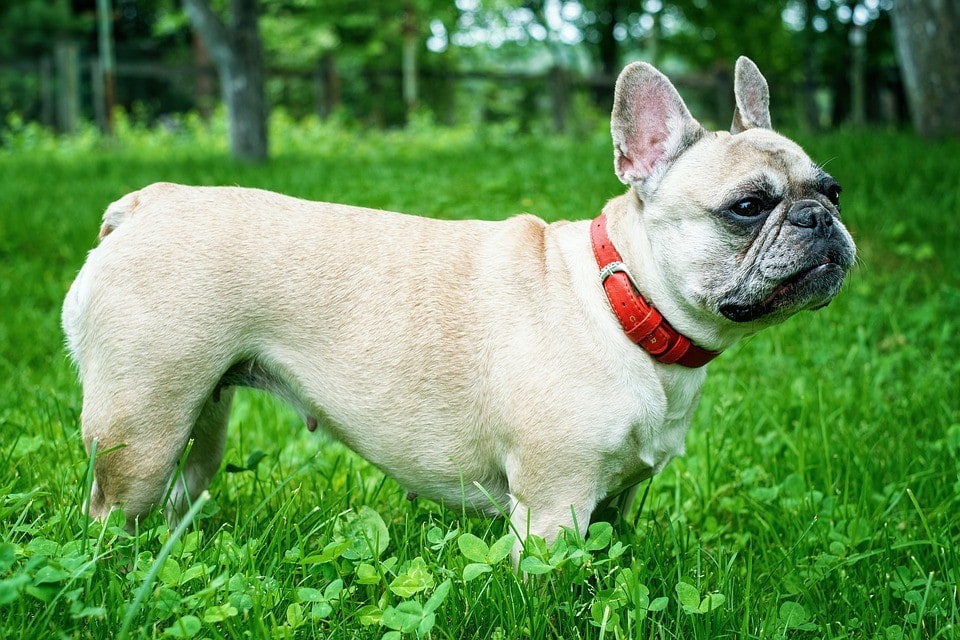How Long Do French Bulldogs Live? Average Lifespan, Data & Care
Updated on

Click to Skip Ahead
French Bulldogs are usually not very long-lived. They were bred mostly for appearance. Therefore, they tend to be prone to health problems, which often lead to their eventual death.
When you purchase a dog, you commit to taking care of it for its whole lifespan. Therefore, it is often best to know how long you can expect your dog to live. If you’re adopting a French Bulldog, you should plan to be a pet parent for 10-12 years. Below, we’ll take a complete look at a Frenchie’s average lifespan and what factors affect it.
What’s the Average Lifespan of a French Bulldog?
Often, Frenchies live about 10–12 years, according to the AKC. This is about average for a medium-sized breed. Most Frenchies will perish sometime before their 13th birthday. However, it can vary quite a lot. There are many factors that go into how long your French Bulldog will live.
Let’s take a quick look at some of those factors.

Why Do Some French Bulldogs Live Longer Than Others?
1. Nutrition
If you feed your dog well, they are much less likely to live for a long time. An overweight or obese dog is much more likely to experience health problems. Furthermore, nutritional deficiencies can also cause health problems, which may shorten your dog’s lifespan.
2. Environment
The environment can affect your dog’s longevity. For instance, if your dog is left in the cold or heat often, then they are likely to develop some health issues. For this reason, you should be cautious about putting your dog out in the cold or heat, especially since Frenchies aren’t designed to handle extreme temperatures.
3. Size
Smaller dogs typically live longer than large dogs. However, this isn’t always true. A “micro” Frenchie will likely have some birth defects, which can lead to a shorter lifespan. Pushing more dog into less room is typically not a good idea.

4. Sex
Male dogs are slightly more likely¹ to live longer than females. However, this isn’t always the case and the effect isn’t very large in the least. Therefore, you don’t need to consider sex when you’re choosing a puppy.
5. Genes
Some French Bulldogs are prone to health problems due to genetics, while others are not. Obviously, dogs that die younger are more likely to pass similar problems onto their puppies. For this reason, we recommend choosing a quality breeder that takes potential genetic problems seriously.
6. Breeding History
Breeding can often cause nutritional deficiencies and takes a toll on a dog’s body. Therefore, they may live a shorter lifespan if they were previously bred. Of course, it does depend on the care they experience during their pregnancy.

7. Healthcare
If a dog receives the proper vaccines and preventative care, then they are more likely to live longer. A good example of this is a dog’s dental health. Dental conditions kill many dogs because they lead to infection. Preventative dental care can help a dog live much longer.
The 3 Life Stages of a French Bulldog
1. Puppy

When you first adopt a Frenchie, they will likely be a puppy. This stage is extremely important, as it lays the foundation for what is to come. When a dog is properly cared for as a puppy, they are likely to grow correctly and less likely to end up with health conditions later on.
Of course, there are tons of other factors to take into account, too. However, how a puppy is cared for has a permanent effect on its health.
Therefore, be sure to feed your puppy quality food and take them to all their checkups. Keep your puppy in a good physical condition, but avoid overexercising. Often, this can lead to serious problems later on in life, as it can affect their growth plates.
2. Adult

After your dog stops growing, they are officially an adult. While your dog is an adult, it is vital that you continue to support their health. Proper nutrition, exercise, and vet care are vital. Overweight dogs are much more likely to experience health complications, so be sure to keep your dog at the proper weight.
You may need to use a weight-control food to do so. Speak with your vet to find out if this food is right for your dog.
Again, dental care matters a lot, so be sure to brush your dog’s teeth and get them regular cleanings at the vet.
3. Seniors

Senior dogs are more likely to develop health conditions than at other stages. Just like humans, dogs tend to slow down as they age. They may experience mental decline, as well. Often, your dog’s health at this stage involves the same things that it did when they were an adult.
However, you often have to manage certain health conditions, as well. In these cases, be sure to work closely with your vet.
 How to Tell Your French Bulldog’s Age
How to Tell Your French Bulldog’s Age
It is challenging to determine the age of a French Bulldog. Sometimes, you can tell their age based on the number of teeth they have, but this only works on puppies. The condition of a dog’s teeth can also determine its age sometimes. However, how their teeth are cared for also matters.
Often, it is best to ask your vet for an age estimate. Your vet can help determine your dog’s age based on a variety of factors.
Conclusion
French Bulldogs aren’t the healthiest dogs out there. However, they do live about average for a dog of their size. With that said, there are tons of factors that affect how long one of these dogs lives.
For instance, genetics plays a high role in a dog’s lifespan. If your dog is prone to diseases because of their genetics, there isn’t typically much you can do. A dog’s nutrition, weight, and vet care also affect it, though. These are factors you can control.
Featured Image Credit: yhelfman, Shuterstock



 How to Tell Your French Bulldog’s Age
How to Tell Your French Bulldog’s Age









